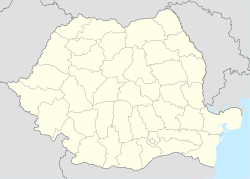| Bersobis | |
|---|---|
 | |
| Alternative name(s) | Berzobis, Berzobia, Bersobia, Bersovia |
| Known also as | Castra of Berzobia, Castra of Jidovin |
| Founded | 2nd century AD |
| Abandoned | 3rd century AD |
| Attested by | Tabula Peutingeriana, Ravenna Cosmography |
| Previous fortification | Dacian |
| Place in the Roman world | |
| Province | Dacia |
| Administrative unit | Dacia Apulensis |
| Administrative unit | Dacia Superior |
| Structure | |
| — Wood and earth structure — | |
| Size and area | 490 m × 410 m (20 ha) |
| Stationed military units | |
| — Legions — | |
| IV Flavia Felix | |
| Location | |
| Altitude | 137 m (449 ft) |
| Town | Berzovia |
| County | Caraș-Severin |
| Country | |
| Reference | |
| RO-LMI | CS-I-s-A-10785 |
| RO-RAN | 51519.01 |
| Site notes | |
| Recognition | |
| Condition | Ruined |
| Excavation dates | 1862–1866 1961–1962 1965–1968 1969–1970 1998–1999 2000–2001 |
Bersobis was an ancient Dacian fortress conquered in Trajan's Dacian Wars with the Romans. It became a legionary fortress in the Roman province of Dacia in the 2nd century AD. It is located near the town of Berzovia, Romania.


The legion Legio IV Flavia Felix built its legionary fortress and base here in about 108 AD which endured till 118/9. It was built in an enclosure with earth and wooden ramparts and with a single defensive trench outside. The principia (headquarters), after the first wooden phase, were rebuilt in stone on the same site. A fire later destroyed it, without being rebuilt. In 118/9 the legion returned to its old south-Danube garrison at Singidunum and a civilian settlement developed on the site of the fort and its canabae which became a city and municipium.
The city became wealthy through trade due to its location on the crossroads from Arcidava (Vărădia) and Mudava (Moldova Veche). A road from Mudava passed through the Roman mining centres from Moldova Noua to Sasca, and from there to Ciclova and Oraviţa, continuing through Maidan, Dognecea and Bocşa ending at Bersobis. A Roman road continued for 12 miles (17 km) to the next Roman fort of Azizis.
The defensive ditch can be seen on the “Erinii road” as well as the traces of town houses.
In 1968 an Imperial helmet was found here.
See also
External links
- Roman castra from Romania - Google Maps / Earth Archived 2012-12-05 at archive.today
Notes
- "Descoperiri Arheologice din Banatul Românesc, de Prof.univ.dr.Sabin Adrian Luca" (PDF). Archived from the original (PDF) on 2011-07-22. Retrieved 2011-08-01.
- O pensetă chirurgicală și un bronz din castrul Bersobis, Alexandru Flutur și Liana Flutur
- Dacia și Pannonia Inferior în cadrul evenimentelor din anii 107-108, Prof.dr. Bogdan Muscalu
- ^ "Lista Monumentelor Istorice 2010 ("2010 List of Historic Monuments")" (PDF). Monitorul Oficial al României, Partea I, Nr. 670 ("Romania's Official Journal, Part I, Nr. 670"), page 877. Ministerul Culturii şi Patrimoniului Naţional. 1 October 2010. Archived from the original (PDF) on 10 June 2012. Retrieved 4 January 2013.
- ^ "51519.01". National Archaeological Record of Romania (RAN). ran.cimec.ro. 2012-07-22. Archived from the original on 4 March 2016. Retrieved 4 January 2013.
- Berzovia–Berzobis http://legionaryfortresses.info/berzovia.htm
- "Dumitru Protase: Castrul legiunii IIII Flavia de la Berzovia. Săpăturile arheologice din anii 1965–1968" (PDF). Archived from the original (PDF) on 2012-03-10. Retrieved 2011-08-10.
- Touristic route no. 4: The Romans’ Roads (I) https://banatul-montan.ro/en/the-romans-roads-i/
45°25′45″N 21°37′16″E / 45.429085°N 21.621184°E / 45.429085; 21.621184
Categories: